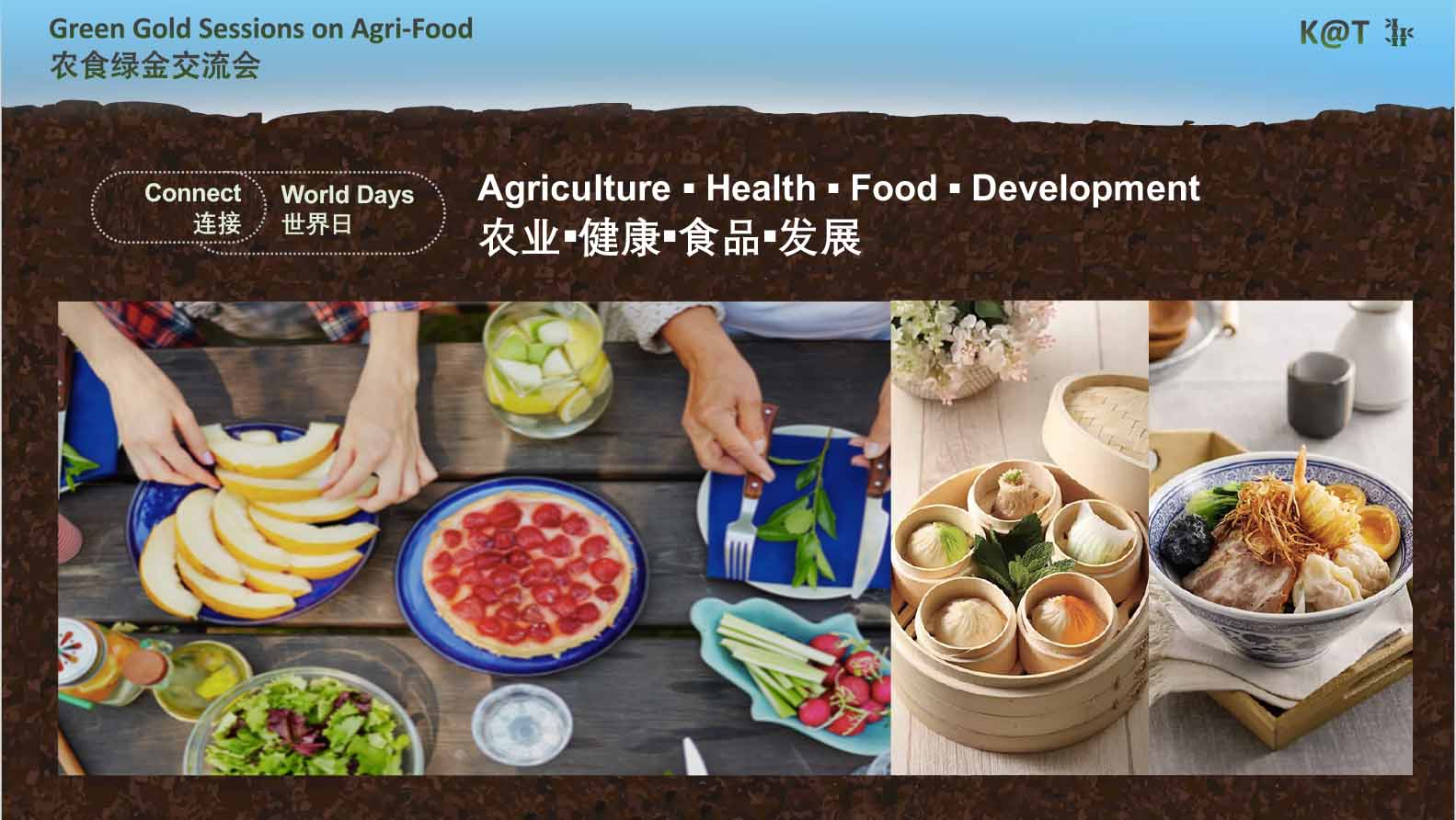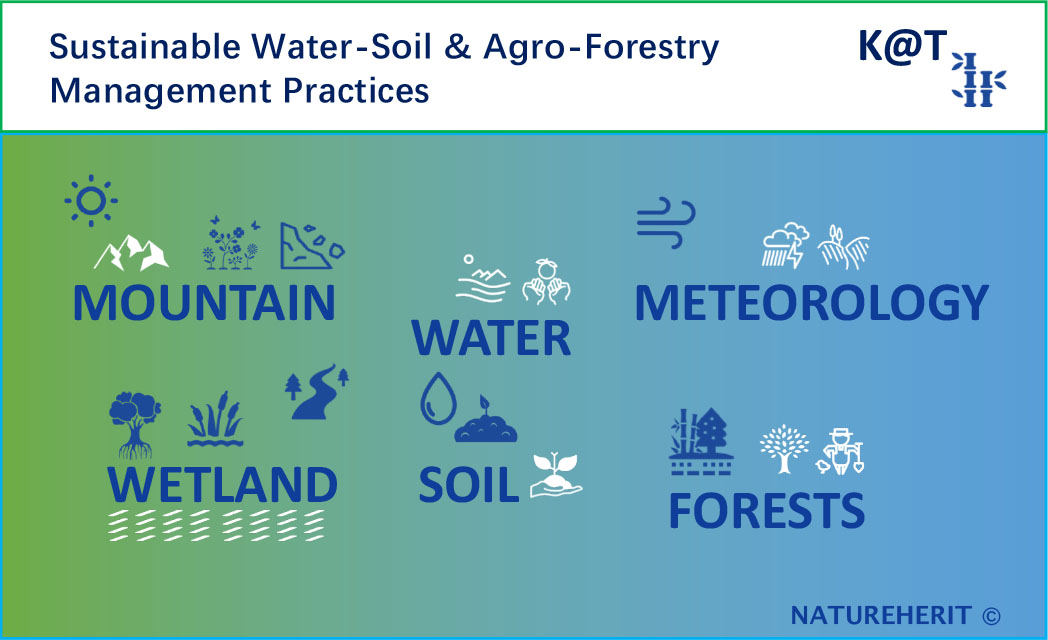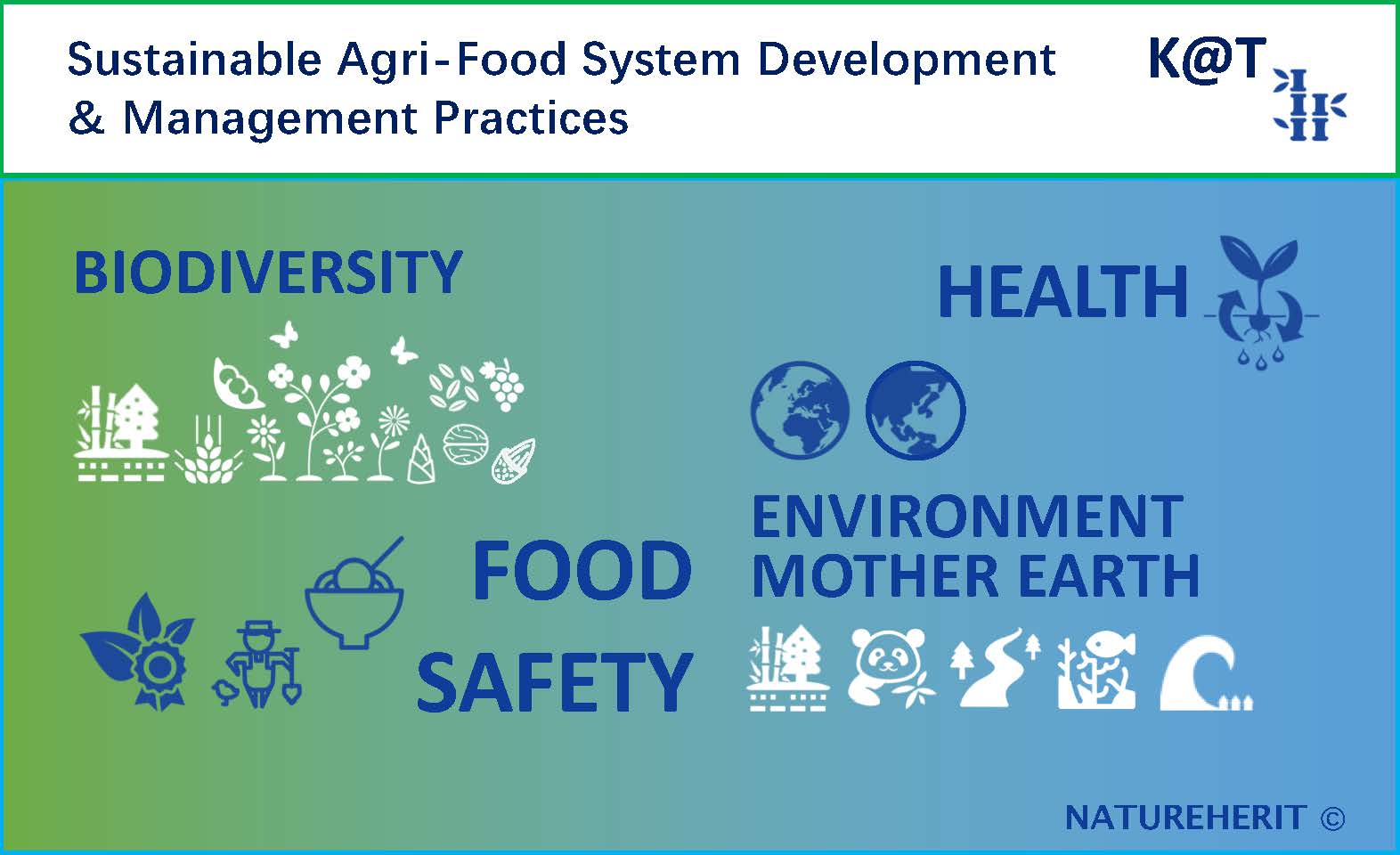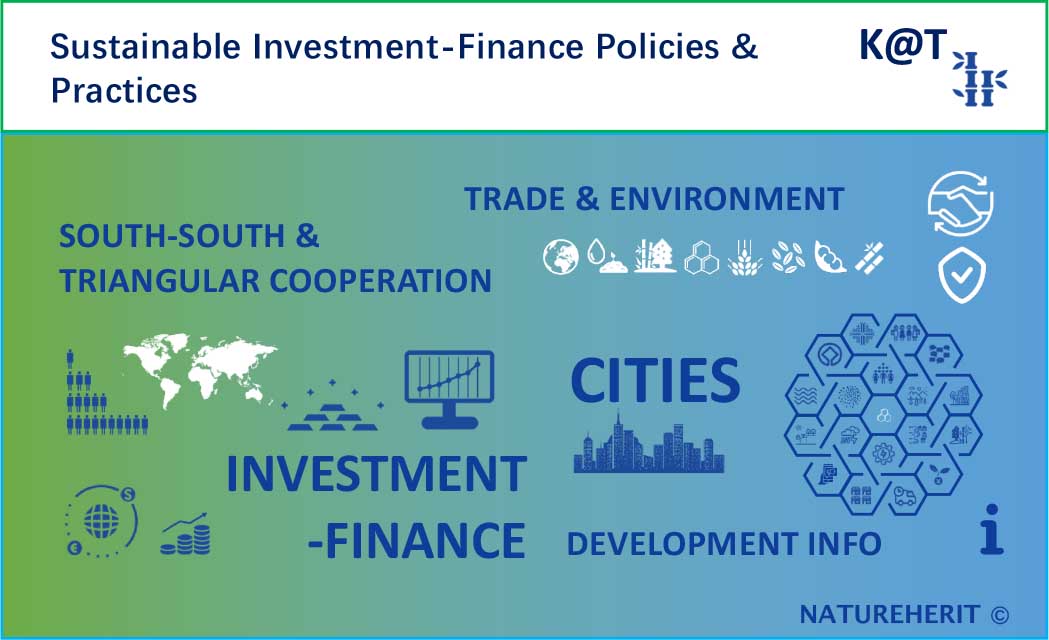Announcement & Intro: Green Gold Sessions on Agri-Food (2023)
Discussion details

In 2023, alongside carbon-neutrality actions and AI innovations, agri-food production is expected to meet continuous high market and policy attention on international and regional levels. According to The State of Food Security and Nutrition in the World 2022, the world is moving backwards in its efforts to end hunger, food insecurity and malnutrition in all its forms. The intensification of the major drivers behind recent food insecurity and malnutrition trends (i.e. conflict, climate extremes and economic shocks) combined with the high cost of nutritious foods and growing inequalities will continue to challenge food security and nutrition.
Meanwhile, global climate change and extreme weather are becoming increasingly severe. The disaster threats on ecological protection, restoration, and socio-economic development around the world are rapidly increasing. The impact of climate change on agriculture and food is more severe than any other sector. According to recent United Nations‘ data, agri-food systems account for about one-third of global emissions (averagely 18 Gt CO2eq per year, incl. agricultural production, land use change and supply chain activities). Therefore, agri-food system transition is a main area of action to curb climate change. Agri-food practices have to become comprehensive solutions against multiple crisis: When producing sufficient high-quality and healthy food, form sustainable carbon storage pools everywhere, improve cultural inheritance, income levels, land degradation, water scarcity, and biodiversity degradation etc.
"Alternative approaches and innovative solutions are needed to transform global agri-food systems in the face of challenges, such as rapid population growth, economic downturns, extreme climates and changing consumption patterns", as highlighted by the UN-FAO. -- This concerns social-economic and technical-industrial chains in multiple fields, that need to increase exchanges based on scientific evidences and solutions.

To understand and present more above-mentioned solutions to global-regional stakeholders,, especially economically efficient technologies, the Green Gold Sessions on Agri-Food (GGS-AF) has been initiated by Natureherit DC and Knowledge@Terra Classrooms with cooperators and stakeholders. With the platform at the EU international cooperation and development knowledge sharing platform Capacity4Dev, the on-offline meetings and encounters are to build innovative exchanges and cooperations among institutions and colleagues in the EU, China and other regions, while messages of the selected World Days shall be disseminated.
The GGS-AFs are also multi-actor capacity building activities of regional and inter-regional stakeholders:
-
Help the public understand international actions and World Days related to sustainable agri-food systems, especially common challenges (climate change, water resource, food security-safety etc.), nature-cultural heritages, agri-food policies and technology solutions in their own and other regions;
-
Introduce ecognizable key agri-food system indicators for interested pubic, such as farmers, professionals, youth, entrepreneurs, artists, investors and financiers , so that they could participate in more knowledge sharing, technologic transition and climate actions of sustainable agri-food systems, while improving livelihoods;
-
During spatial planning implementation process, foster high-quality information monitoring, reporting and exchange of investment-finance projects with government agencies, researchers, practitioners, technology providers, investors and financial advisors etc.
As a starting dialogue, Green Gold Sessions on Agri-Food can be combined with many existing activities. Key takeaways and best solutions shall be shared with interested universities and schools to inspire multi-facet researches and practices.
Based on an independent study by Natureherit DC, GGS-AF has set up three interlinked themes in 2023, connecting the World Days and Sustainable Agri-Food Systems:
Theme 2023-I "Water-Soil▪Mountain-Forest▪Wetland" (Sustainable Water-Soil & Agro-Forestry Management Practices)
12th-14th April 2023
Dec.- Mar. World Days/Weeks: Soil ▪︎ Mountain - Wetland - Water - Forest - Meteorology (Climate)
Ecosystem management of water-soil, forests, plains, mountains, and wetlands is the foundation of interconnection, ensuring more healthy food and a better environment. For example, vibrant rivers, lakes and watershed environments support urban-rural life; Forests, lakes, and streams in mountainous areas ensure agricultural production in plains; Water, soil and mineral resources, as well as greener energy management maintain socio-economic development...... In changing climate and weather conditions, urban and agricultural soil health management, watershed environment and resource management, are facing joint challenges and solution gaps.
The 12 presenters from 7 countries (China, Germany, Spain, Italy, Switzerland, India and The Netherlands) are from international organisations, research institutes, technology providers and technical innovation companies. The presentations covered policy-practice and technical solutions, as well as key indicator systems and socio-economic participations in "Soil-Mountain-Forestry" and "Water-Wetland" topics.
Organized by Natureherit DC & Knowledge@Terra Classrooms (K@T); Co-organized by Institute of Agricultural Science and Technology Information, Shanghai Academy of Agricultural Sciences (SAAS-IASTI).
Event details see here.
The multimedia summary will be released soon. Please stay tuned!
Theme 2023-II “Health▪Environment▪Food Safety” (Sustainable Agri-Food System Development & Management Practices)
Sept.-Oct. 2023 (internal sessions)
Apr.-Jul. World Days/Weeks: Health ▪︎ Mother Earth ▪︎ Biological Diversity ▪︎ Environment ▪︎ Food Safety etc.
Based on knowledge and info from Theme I, integrated indicator and policy basis for food safety shall be explained. Innovation in food-nutrition quality evaluation systems based on regional green-organic agri-food production practices shall be discussed to protect the environment, climate resiliency, life and health of people, plants and animals.
Taking North China and Central Plains as the regional example, the internal sessions are about climate environment, food safety, and health development, in a dialogue with the middle-lower reaches of the Yangtze River: “How can agri-food standards and certifications promote high-quality development of ecological environment and food security?” The multi-actor sharers are from relevant fields. The attendance is only for invited parties, while a summary over the discussion shall be shared with the public.
Organizers: Natureherit DC & Knowledge@Terra Classrooms (K@T)
Co-organizers :Institute of Farmland Irrigation, Chinese Academy of Agricultural Sciences (CAAS-IFI), Eco Civilization Promotion Association of Nanyang City, Eco-Environmental Protection Research Institute, Shanghai Academy of Agricultural Sciences (SAAS-EEPRI)
Theme 2023-III “Investment▪City▪Cooperation” (Sustainable Investment-Finance Policies & Practices)
Nov.-Dec. 2023 (public / internal sessions)
Aug.-Nov. World Days/Weeks: South-South Cooperation ▪︎ Investors ▪︎ Trade & Environment ▪︎ Development Info ▪︎ Cities etc.
Based on Theme 1 and 2, exchange knowledge of consumption and trade of high-value agri-food systems in cities and regions, relevant market certification, indicators and investment-finance solutions, create meeting opportunities for agri-food development project initiators and managers with government departments, investors and financiers.
October-December is the time period for many important urban and regional exchanges, international trade, green investment and global climate meetings. Therefore we consider cooperation with related activities.
After the event, an annual brief summary will be finalized, including the exchange progress and interactive discussions of all three themes. It shall include all three focuses: sustainable investment-finance, agro-forestry and food production sectors from the previous two blocks, in order to cristalize green transition planning and projects, which feasbility, low-risks and sustainability are proven.
* Note over the World Days:
The World Days are seen as enabling "connection moments" for knowledge and data sharing of sustainable development communities across the world. The independent study by Natureherit has researched content and models of 200 world celebration days, that cover environmental, social and economic topics, incl. ca. 190 International Days and Weeks observed by the United Nations. It is observed that many of these global moments still lack sufficient connections to regional players to learn global mandates, policies, solutions, cooperation opportunities as well as project progresses etc. Different world day resources could be better connected to each other and national-regional celebration days, to help governmental institutions, sectoral platforms and practical solutions to report and exchange, for example:
Sustainable soil management could be celebrated in various World Days & Weeks, especially the following: Soil, Water, Mountain, Wetland, Forests, Meteorology (Weather), Mother Earth, Health, Food Safety, Cities, Trade and Environment, Investment etc.
* Note over the Knowledge@Terra Classrooms (K@T) & Green Gold Sessions (GGS):
Knowledge@Terra Classrooms (K@T) is a group platform on Capacity4dev, the European Commission’s knowledge sharing platform for International Cooperation and Development.
To promote inter-regional communication on green-circular economy and climate actions, and to understand and disseminate policy practices and technical solutions that integrate climate, land, soil and water resources, Knowledge@Terra Classroom (K@T) was launched on World Soil Day in December 2018 by Natureherit DC and supporting partners. In May 2019, the testing progress was reported at an international symposium organized by the Food and Agriculture Organization of the United Nations (UN-FAO). Since September of the same year, inter-regional activities of K@T has been tested on the sub platform set up on Capacity4dev. (Capacity4dev is the European Commission’s online knowledge-sharing platform, created by the Directorate General for International Partnerships (INTPA), that connects development professionals and lets them learn, share, and collaborate with other colleagues and stakeholders. Users include EU institutions staff, as well as development professionals from EU member states, partner governments, civil society, NGOs, international organisations, and the private sector.)
On the K@T Platform, public and internal Green Gold Sessions (GGS) aim at discussing, debating and disseminating key hazards and advanced solutions from cities, countryside and regions. If you have any comments or suggestions, please contact us at xyliu@natureherit.com (Xiaoying Liu); lboeraeve@natureherit.com (Luc Boeraeve).




Log in with your EU Login account to post or comment on the platform.